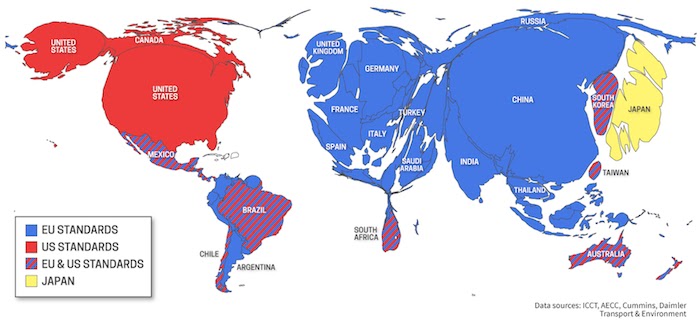The EU has long been a global force for cleaner transport. As a first mover, its standards have not only benefited citizens but given European industry a huge advantage by setting examples in transport regulation that are often replicated by emerging markets. Recently, there have been moves to slow down or stop this trend – through trade deals like CETA, Mercosur, Indonesia, (or the dormant TTIP) as well as EU initiatives such as ‘REFIT’ and the Better Regulation agenda. We campaign to retain and, where possible, improve Europe’s ability, and willingness, to legislate for the common good in general, and for more sustainable transport in particular.
Introduction
There is nothing inherently bad about trade, but as many tariffs are already low, negotiations have shifted towards a broader set of issues such as rule-making, investment and regulatory cooperation, among others. The main objective of many FTAs (Free Trade Agreements) is regulatory alignment or mutual recognition to prevent new differences from popping up. Such measures can severely hamper the ability of the EU and its governments to act in the public interest.
Ever since the EU introduced majority voting on environmental issues in 1992, it has been a global force for cleaner transport and often a first mover. Examples of ‘EU firsts’ include: abolition of single-hull oil tankers following some nasty spills; a carbon price on aviation fuels through the emissions trading system; binding sustainability criteria for biofuels; pedestrian protection rules for cars; and environmental labels for tyres. These have not only benefited the environment Europeans live in, but have also given the EU tremendous soft power and Europe’s industry a huge advantage: most major emerging markets follow EU rules for road vehicles and fuels, for example.
The sales-distorted world map below shows which countries follow what rules for their road vehicles; ‘EU blue’ still leads the world. The same is true in many other areas like chemicals and pesticides.

Numerous industrial interests want the EU to stop leading, to take fewer new initiatives to protect Europeans and their environment, or at least to adopt the same rules as North America.
The latest generation of trade deals is a good example. The EU-Canada deal (CETA) is the first trade agreement introducing EU-wide investment protection. The controversial investor-state dispute settlement (ISDS) was re-branded into the Investment Court System (ICS), which is now being absorbed into a new Multilateral Investment Court (MIC). However, it still allows foreign investors to bypass normal courts and directly sue European governments in investment arbitration panels. The extraorbitant sums claimed by investors under similar systems may lead to a ‘fright to regulate’ on the part of governments.
There are also numerous internal pressures trying to slow down lawmaking in the public interest. Incessant and increasingly successful calls from industry and some member states are resulting in demands for deregulation and a more ‘slim-line’ Europe. This has triggered the Regulatory Fitness and Performance (‘REFIT’) programme and a so-called ‘Better Regulation’ package that drowns the lawmaking process itself in red tape by introducing new obstacles for EU action. Initiatives like the REFIT Platform are heavily business influenced and carry the risk for watering down environmental legislation instead of improving it.
Our campaign for better trade and regulation aims to retain and improve Europe’s ability and willingness to legislate for the common good in general, and for more sustainable transport in particular.
Better trade
Trade and freight are intrinsically linked – the spectacular increase in global trade has been fuelled by the steep decline in costs of international transport. Internalising the external costs of aviation, shipping and road freight remains one of the key objectives of our work.
However, we are also increasingly concerned about the way the EU approaches its trade negotiations with non-members. We are not anti-trade; cooperation on reduction or elimination of tariffs can greatly enhance economic vitality. Rather, we are alarmed by the emergence of ‘post-Lisbon’ deals that go far beyond classic tariff negotiations and threaten to create a ‘fright to regulate.’ This means that the EU will have less room to make its own policies and set its own standards to protect people and the environment in the future, all because of obligations to and pressure from external trading partners. (We experienced this with the Fuel Quality Directive). The traditional deep secrecy most negotiations take place in does not help to alleviate concerns.
T&E closely monitored the EU’s free trade agreement negotiations, by being members of the DG Trade’s Group of Experts on EU Trade Agreements. T&E also actively monitors multiple ongoing negotiations both by region and issue, progress on implementation of agreements by participating in regional Domestic Advisory Groups for Canada, and Peru / Columbia. We also participate in the Civil Society Dialogue Contact Group. At an international level we are observers to the United Nations Commission on International Trade Law (UNCITRAL) working group, undertaking a global revision on ISDS and the establishment of the Multilateral Court on Investment (MIC).
Better regulation
European Commission president Jean-Claude Juncker made ‘Better Regulation’ a cornerstone of his Commission upon taking office in 2014. Mr. Juncker appointed a new ‘First Vice-President’ to design and execute a ‘Better Regulation’ package, which was subsequently launched in 2015. The aim of the package, the Commission claims, is to streamline policy making while eschewing regulation and instead focusing on improvements to existing regulations.
We are increasingly concerned by this EU-wide approach under the new Better Regulation package. This is not because we don’t believe ‘Better Regulation’ is impossible or unnecessary; we have not been shy in criticising the complicated and ineffective way Europe regulates the sustainability of its transport fuels, for example. It is because, for many, including Mr Juncker, ‘Better Regulation’ is a euphemism for less regulation.
Environmental policy often gets unwelcome special attention in such ‘Better Regulation’ efforts, despite the fact that environmental protection is impossible without legislation, that environmental policy is one of the few areas in which Europeans actually want the EU to act, and that only 0.6% of the administrative burden from EU laws comes from environmental laws. We want better laws to protect the environment, not fewer ones to protect special interests.
T&E closely monitored the EU’s Better Regulation agenda, by participation in the REFIT expert group.
